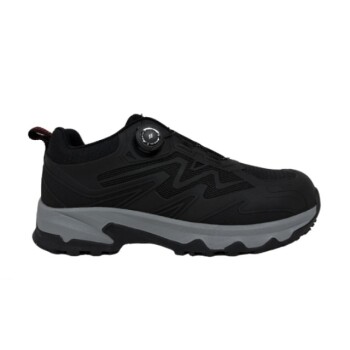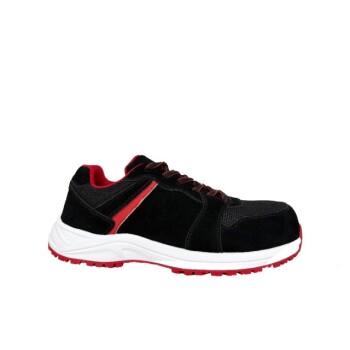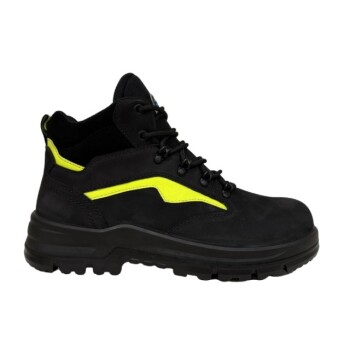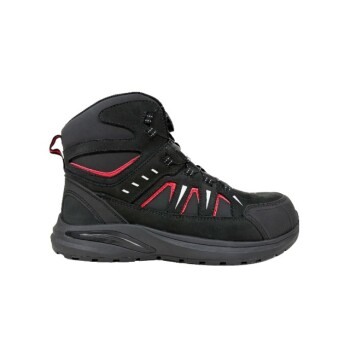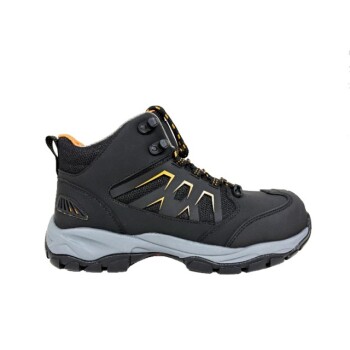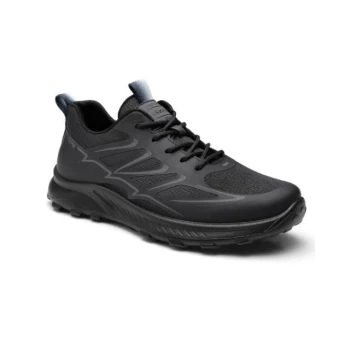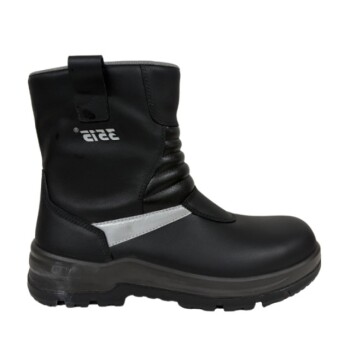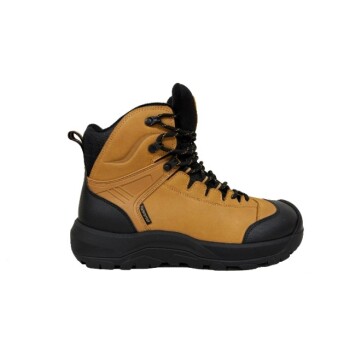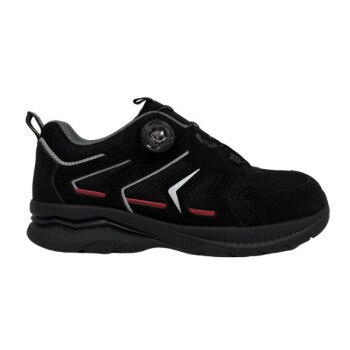To quickly test the arch support of a slip-resistant shoe, you should attempt to bend it in half. A shoe with proper structural integrity will resist bending in the middle, indicating it is sturdy enough to support your foot's arch throughout a long and demanding workday. This simple physical check is a reliable first step in preventing foot pain and related injuries.
The stiffness of a shoe's midsole is a direct indicator of its arch support. While a shoe must flex at the ball of the foot for natural movement, a shoe that easily folds in half lacks the fundamental structure required for all-day stability and comfort.
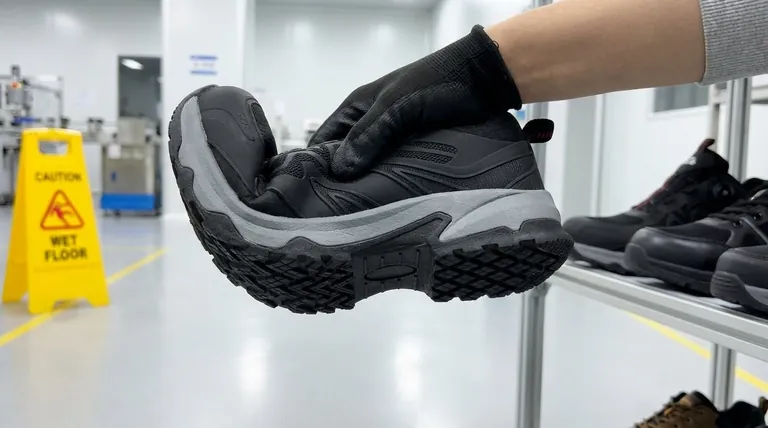
Why Arch Support is Critical in Work Shoes
Professionals in fields like healthcare and food service spend the majority of their shifts standing and walking, often on hard, unforgiving surfaces. This places immense and repetitive stress on the feet.
Preventing Chronic Foot Ailments
Proper arch support is your primary defense against common workplace injuries. It helps maintain correct foot alignment, which prevents conditions like plantar fasciitis, fallen arches, sprains, and shin splints from developing over time.
Reducing Fatigue and Strain
A supportive shoe bears the load that would otherwise be placed on your muscles and ligaments. By providing a stable foundation, it significantly reduces overall foot and leg fatigue, allowing you to remain comfortable and focused during extended shifts.
How to Perform the Definitive Support Test
A visual inspection isn't enough to gauge a shoe's internal structure. You need to physically test its construction to understand how it will perform under pressure.
The Bend Test
Hold the shoe with one hand on the heel and the other on the toe. Attempt to bend the shoe in half, pushing the two ends toward each other. A well-constructed shoe will offer significant resistance and will not fold in the middle.
The Twist Test
Next, hold the shoe at both ends and try to twist it. A shoe with good torsional stability will resist this motion. Excessive twisting is a sign of a weak structure that will not properly support your foot during dynamic movements.
Identifying the Correct Flex Point
While a shoe should be rigid through the arch, it must flex where your foot naturally bends. A quality shoe will bend easily at the ball of the foot, allowing for a comfortable and efficient stride. If it doesn't bend there, it can cause discomfort and an unnatural gait.
Understanding the Trade-offs
When selecting a slip-resistant shoe, many people mistakenly prioritize softness over structure. Understanding the balance between cushioning and support is essential.
The Myth of "Cushiony" Comfort
An overly soft, flexible shoe may feel comfortable for a few minutes, but it provides no real support. Over a long day, this lack of structure forces the muscles in your feet to work overtime, leading to significant pain and fatigue.
The Importance of Durable Materials
The support and slip resistance of a shoe are directly tied to its materials. Look for soles made from high-grade rubber or polyurethane. These materials provide the necessary combination of grip, durability, and structural firmness.
Construction is Key
Beyond the sole, look for reinforced construction throughout the shoe. Sturdy uppers and a reinforced toe box contribute to the shoe's overall stability, protecting your foot and ensuring the shoe can withstand the demands of a professional environment.
Making the Right Choice for Your Needs
Selecting the correct shoe involves matching its features to the specific demands of your job.
- If your primary focus is preventing foot fatigue: Prioritize a shoe that passes the bend and twist tests, ensuring it has rigid arch support and torsional stability.
- If your primary focus is maximum safety on wet floors: Inspect the sole for an intricate tread pattern, often with hexagonal or circular channels designed to move liquid away from the point of contact.
- If your primary focus is all-day durability: Choose a shoe with a thick rubber or polyurethane sole, water-resistant uppers, and reinforced construction.
Ultimately, a quality slip-resistant shoe is an integrated system where strong arch support is the foundation for both safety and endurance.
Summary Table:
| Test | How to Perform | What to Look For |
|---|---|---|
| Bend Test | Hold heel and toe, bend shoe in half. | Significant resistance; should not fold easily. |
| Twist Test | Hold both ends and twist the shoe. | Resists twisting; indicates torsional stability. |
| Flex Point Check | Bend shoe at the ball of the foot. | Should flex easily at the ball, not the arch. |
Need durable, supportive footwear for your team?
As a large-scale manufacturer, 3515 produces a comprehensive range of slip-resistant shoes and boots for distributors, brand owners, and bulk clients. Our shoes are engineered with the structural integrity and durable materials (like high-grade rubber soles) detailed in this article, ensuring all-day comfort and safety for professionals in healthcare, hospitality, and industrial settings.
Contact us today to discuss your footwear needs and request a catalog!
Visual Guide
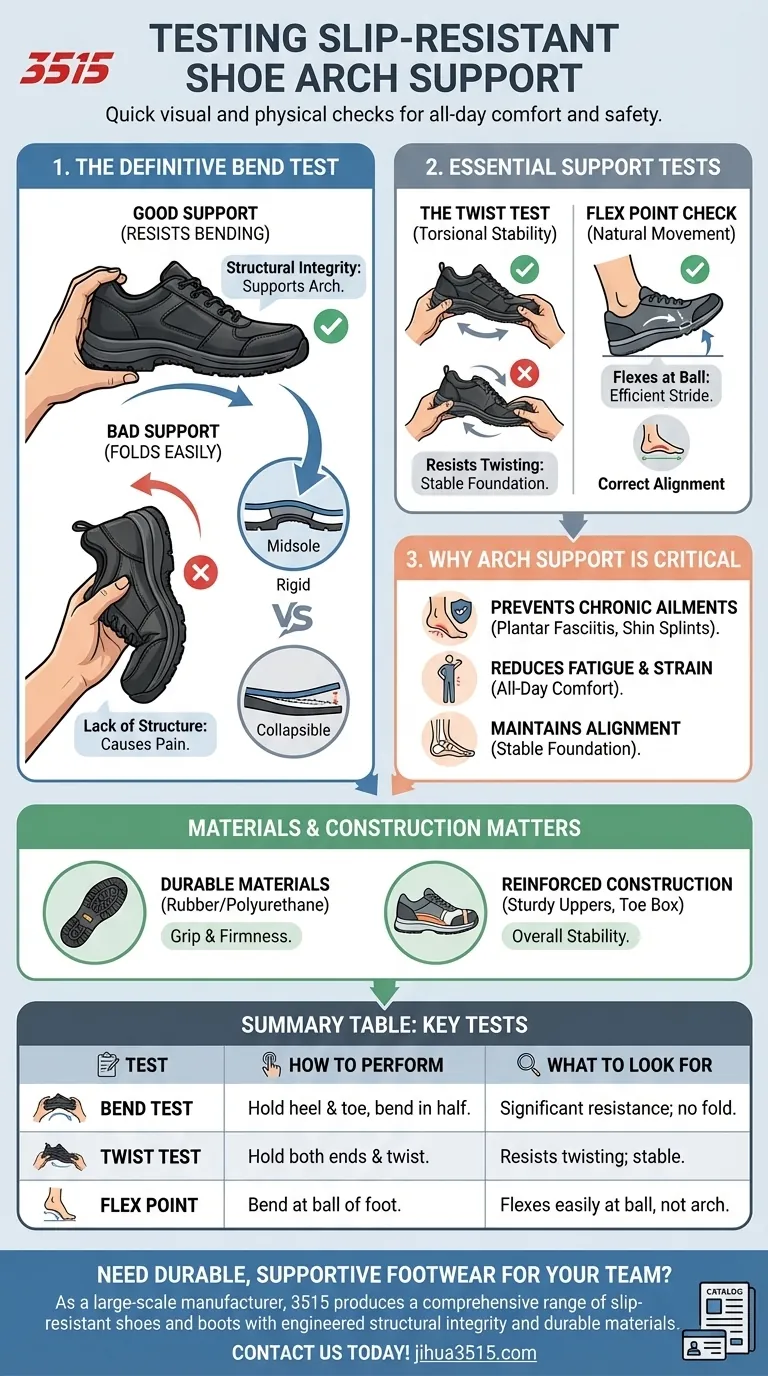
Related Products
- Advanced KPU Athletic Safety Shoe with Steel Toe Cap Anti-Slip Rotary Lacing System
- Safety Footwear Wholesale Manufacturer for Custom OEM/ODM Production
- Premium Suede Sport Safety Shoes for Wholesale & Bulk Orders
- Wholesale Premium Waterproof Nubuck Safety Shoes Boots
- Durable Rubber-Soled Utility Shoes for Wholesale & Custom Brand Manufacturing
People Also Ask
- What are the advantages and disadvantages of steel toe boots? A Guide to Maximum Protection vs. Comfort
- Why is it important to select breathable and supportive materials for work boot uppers? Enhance Safety and Comfort
- What does the infographic mentioned in the article cover? Prevent Workplace Foot Injuries with the Right Safety Footwear
- What is the significance of composite or steel toe protection in work boots? Ensure Maximum Foot Safety & Comfort
- What are the key safety features to consider when choosing work boots? Ensure Maximum Protection for Your Job
